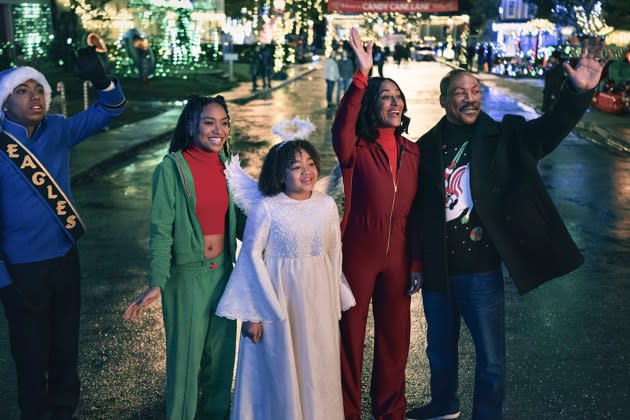‘Candy Cane Lane’ Review: Eddie Murphy and Tracee Ellis Ross Can’t Redeem Reginald Hudlin’s Bizarre Holiday Comedy

A neighborhood holiday house-decorating contest intensifies to an unbelievable degree in Reginald Hudlin’s peculiar Christmas film, Candy Cane Lane. The stakes are high for Chris Carver (Eddie Murphy), a Yuletide obsessive determined to win first place for the most festive home in his neighborhood. Every year, he comes in second to his irritating neighbor, Bruce (Ken Marino). This season will be different — although not in the way Chris expects.
It starts with a layoff. After being unexpectedly and unceremoniously fired from his job, Chris finds himself bereft of purpose. He struggles to tell his family the truth and urges his wife Carol (Tracee Ellis Ross) to keep the news between them. Instead of being honest with his three kids, Chris vows to make this Christmas the best one ever. His daughter, Joy (Genneya Walton), is going off to college next year, which means Carver family gatherings won’t be the same. Nick, their son (played by Thaddeus J. Mixson), is right behind her. Changes to the annual contest — there’s a $100,000 prize this year — only fuel Chris’ desire to win.
More from The Hollywood Reporter
'Beverly Hills Cop 4': First Photo Released of Eddie Murphy Back as Axel Foley
Eddie Murphy, Tracee Ellis Ross Battle Naughty Christmas Elf in Official 'Candy Cane Lane' Trailer
When it comes to holiday movies, Candy Cane Lane isn’t at the very bottom of the pack, but it’s far from the top. As Chris tries to build the best display and learn some Christmas lessons, his adventures become increasingly offbeat. The narrative careens through uncompelling territory before ending on a forgettable note.
During his first day of unemployment, Chris ignores Carol’s request to drop off their youngest daughter, Holly (Madison Thomas), at school. Instead, he drives around their California neighborhood in search of the perfect decorations. They strike out at the big box stores — coming upon empty shelves and off-season merchandise. (Target has already put out the pink hearts and chocolates for Valentine’s Day.) Just as the father-daughter pair are about to give up, they stumble upon a pop-up shop tucked underneath a freeway.
It’s owned and operated by Pepper (Jillian Bell), a strange woman whose eagerness to sell Chris holiday wares should have been an immediate red flag. Enthralled by the details of her decor — including a miniature set of life-like dolls — Chris fills his shopping cart while unloading his problems onto Pepper. He buys an enormous tree with the ‘Twelve Days of Christmas’ characters on it. She promises it will make his wish (to win the neighborhood competition) come true and asks him to sign a receipt with inches of fine print.
There’s a lot of set-up and atonality in Candy Cane Lane, which feels like three different movies before its primary narrative gets going. The familiar sentimentality of Chris’ layoff abruptly transitions into a more sinister mood when he enters Pepper’s shop. Is this a heartfelt Christmas movie or a more surrealist exercise? Candy Cane Lane asks: Why not both?
In theory this could work, but Candy Cane Lane’s story (the screenplay is by Kelly Younger) prevents it from doing so. The film functions as a vehicle for stale jokes about modern life instead of a coherent narrative centered on holiday cheer. The trip to chain stores gives Chris a chance to comment on how quickly the seasonal sections move on, and the encounter with Pepper is fodder for a tepid conversation about the capitalistic underpinnings of Christmas. These scenes play as desperate to prove the film’s relevance and self-awareness.
Christmas movies don’t need all the winking asides Candy Cane Lane relies on. It’s one of the few genres generally spared the self-conscious quips that have tainted most recent comedies. Holiday films can be as unabashedly sappy and ridiculously contrived as they want, as long as they engage with some universal emotions. But it’s hard to locate Candy Cane Lane’s heart, because it’s so preoccupied with its own clever detours and zany plotlines.
A number of solid performances are worth noting even though they don’t save the film. Murphy and Ross deliver assured comic turns and manage to deepen their characters by accentuating the strength of Chris and Carol’s marriage. Danielle Pinnock and Timothy Simmons play two local news anchors, whose low-key feud is one of the film’s genuinely funny threads.
After Chris unboxes the tree onto his front yard, peculiar things start happening in the neighborhood. He wakes up the next day to find all the characters cut out from their ornaments and seven swans swimming in his pool. At first he blames Bruce, accusing the Franzia-loving neighbor of sabotage. But after consulting with Holly, Chris realizes that the deal with Pepper was a sour one.
It turns out she’s a disgruntled elf — a North Pole reject out to prove her moral superiority by punishing people she deems unworthy; Chris, with his wish to win a community competition, falls into this category. The scope of Candy Cane Lane widens when Chris realizes his problems run much deeper than unemployment. If he doesn’t collect the golden rings from the tree, Pepper will turn him into a doll. He will meet a fate similar to the other miniature people he admired at the shop earlier (voiced by Nick Offerman, Chris Redd and Robin Thede).
The adventure takes many turns, with Chris trying to save his family from Pepper’s vengeful wrath. Despite how often Candy Cane Lane attempts to convince us of its stakes, they never feel urgent. Chris uncovers more truths about Pepper, he conscripts his wife and children to help him defeat her and they all learn some lessons along the way. But with so much going on, hardly anything sticks.
Best of The Hollywood Reporter
